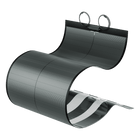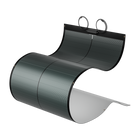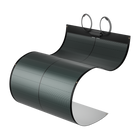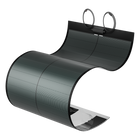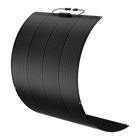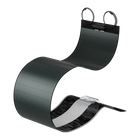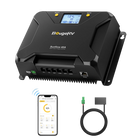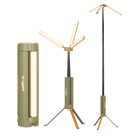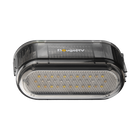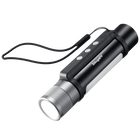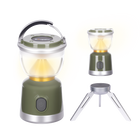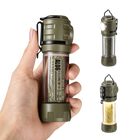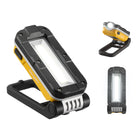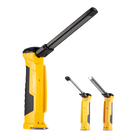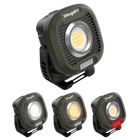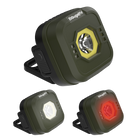Do Solar Panels Work in Winter? How Efficiently Does it work?

With the rising cost of power, renewable energy is fast becoming a mainstay in the power supply chain. Solar energy is cheap and reliable, and the need for solar panels has increased.
A Solar panel is a low-cost energy source to power a wide range of appliances in your home with the help of the radiant energy of the sun.
Solar panels work efficiently all year round by converting rays of sunlight radiating from the sun into electrical energy.
Solar Panels Working in Cold Weather
Regardless of the season, solar panels can generate electricity. Even in cases where the temperature is at freezing point, solar panels can turn sunlight into electricity.
The solar panel can work effectively in cold weather because they absorb the energy from the sun's light and not necessarily from the heat emitted by the sun itself.
Although, with shorter sunlight hours and various weather factors, such as snow, rain, ice, fog, or clouds, these external influences can make your solar panels work less efficiently, and just how much depends largely on the severity of the bad weather.
Winter climates are optimal for solar panels and all other climates worldwide. Solar Panels will generate electricity as long as sunlight can strike the surface of the solar panel.
When you experience power outages during Winter, you can attribute this outage to increased snowfall. The reduced output is because the increased snowfall reduces the surface area in contact with the sun's rays.

So, solar panels work in Winter when photon particles from the sunlight strike the solar panel photovoltaic cells, thereby putting in motion the electrons in the silicon.
An electric current is created by the above process and sent to an electric distribution box from where the electrical energy is distributed to other appliances.You can also use a solar battery to trap some of these currents and store them for use in later times.
In the Winter, solar panels don't reach their peak temperature or power due to snow deposition. This is because the amount of photovoltaic cells in contact with the sun's rays determines the electrical output.
For example, one homeowner who installed solar panels found that their rooftop solar system produced about 40-60% less energy in December and January than in July and August. Of course, solar panels can be used to generate electricity in the winter.
On the contrary, from an economic point of view, winter is also the best time for solar panels to power homes and businesses. Here is a brief list of the advantages and disadvantages of using solar panels in the winter.
Advantages of using Solar Panels in Winter
Here is a summary of some of the advantages you could enjoy when using your solar panels in the winter season:
- Solar power causes no greenhouse gases due to its pollution-free nature.
- You reduce your dependence on foreign oil and fossil fuels
- You have renewable every day of the year, and even cloudy days produce some power.
- Some U.S. states have specific incentives for using solar systems
- You can install it virtually anywhere, in a field or building.
- You can use batteries to store extra power for use at night.
- It is safer than traditional electric current
Disadvantages of using Solar Panels in Winter
You could also encounter some disadvantages when you install a solar panel during Winter. Here are some of such disadvantages:
- First, there are high initial costs for material and installation.
- Second, in the Winter months, there is lower solar production.
- Excessive covering of the solar panels with snow halts electricity production
- It would help if you had lots of space as efficiency is not 100%
- if you need solar power at night, there is a need for a large battery bank.
- When you use devices that run on DC power directly, you should know that they are more expensive.
- The size of your solar panels varies for the same power generation depending on geographical locations.
- You expect your solar panel to produce less energy when the days are cloudy.
- Lack of materials and technology hinders the mass production of solar panels; hence the cost is still high, making it not readily affordable.
What Effects Do Snowfalls have on solar panels?
Snowfall reduces the efficiency of solar panels. When snow falls, it prevents the sun's rays from making adequate contact with the solar panels, decreasing their electricity generation.
While solar panel production decreases when covered with snow, the percentage loss of solar panels is minimal when combined with the total output for the year, and this is still a good investment for the user.
Also, the BougeRV team only recommends that you clear all the snow on your solar array with professional guidance. If not done properly, it could damage your solar panels and not be covered by the vendor's warranty.
Is it necessary to remove snow from solar panels?
As stated above, we still do not recommend removing the snow from your solar panels yourself, as you risk scraping and damaging the solar panels on your roof in the process of removing the snow.
The best way to get rid of snow on your solar panels is to wait for the storm to pass and let the sun shine naturally on top of the snow on your roof, which will generally melt away very quickly. Knowing that your solar panels are equipped to withstand a certain amount of heat is essential.
However, if you have too much snow on your roof that is affecting the productivity of your solar panels, and you are willing to put in some time, and effort to clear it, here are a few tips.
First, if you can use a roof rake to clear the area under the panels to get the snow off, be careful not to scratch the surface of the solar panels too hard. Another way is to use warm air to help the snow melt, for example, by connecting a large blowing air and a long plastic air hose to remove the snow by blowing it hot.
Still another way is to use a garden hose to flush the snow to help it melt quickly, and there is a risk that this will turn the snow into ice.
In short, if you intend to clear the snow on the panel, please make sure you use the right tools. Because rough brushes or rakes can damage your solar panels, it's best to contact your supplier and let them come up with better solutions for you. Also, BougeRV's after-sales team will do their best to serve you.

Do Solar Panels Freeze?
Solar panels can freeze in extreme weather. Solar panels have a tempered glass coating on their surface, and this material is subject to extreme weather conditions. If the panel freezes, the ice will exert some lateral force on the glass coating, which may cause the panel to break.
Of course, not all solar panels are created equal, and BougeRV's solar panels are more durable than the average solar panel. We have designed our solar panels to work in extreme weather conditions, and BougeRV's solar panels can operate at -20 degrees Celsius.
You can consult our pre-sales and after-sales colleagues for specific operating requirements, and we will do our best to serve you.
How to maintain solar panels in Winter
Relatively, solar panels are low-maintenance due to their position, color, and materials used for production.
However, a little attention can go a long way in ensuring that your solar panels work optimally. You can maintain the solar panels by adhering to the following ways:
- First, always keep your solar panel clean and clear.
- Second, save power by putting off some of the appliances not in use.
- Third, use insulating materials to prevent heat losses through the windows and doors.
- Install all weather panel
- Reorient your array
- You can as well hire a professional
Conclusion
Solar panels work effectively in Winter. This is done by converting the radiant heat of the sun to electricity. When the weather is cold, it shows that the electrons are still in relaxed mode, and when they are acted upon, it leads to their excitation and maximum energy production.
The use of solar panels in Winter comes with numerous merits with few demerits. However, when snow accumulates on the solar panels, removing them is not necessary. To learn more about us, you can visit https://www.bougerv.com/.
















